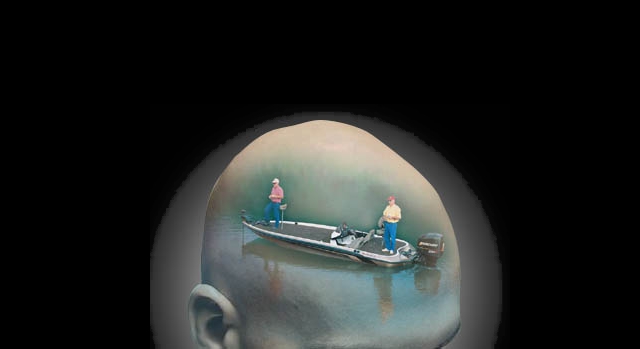Performance Psychology
Emotional meltdowns: What they are and how to avoid them

What gets the attention of sports media faster than an athletic performer or coach who “loses it,” goes berserk or otherwise has a public emotional meltdown? If you said “nothing,” you have the right answer. Normal, reasonable, conventional behavior is boring; it does not draw an audience. Media leaders know what psychological research confirms: We are biologically hard-wired to notice stuff that is bizarre, odd or otherwise out of the ordinary.
Of course, at one level it’s funny to watch the bass pro who wrecks his equipment in a national tournament or the hockey coach who takes off his clothes and throws them on the ice. We can all chuckle and say, “That dude is totally ridiculous.” Privately we might say, “I’m not that crazy; I don’t do anything like that.” And that makes us feel better.
However, since you are a competitive angler, you know that even a small emotional episode can interfere in a big way. Intense, extended episodes of anger, frustration and/or anxiety can easily disrupt your concentration, cause you to lose track of your game plan or, worse, snowball into a major psychic blowout. Entire days or events have been trashed by competitors who lost control of their emotions and could not get back on track. You’ve heard those stories; maybe you have one of your own. But what’s to be done to avoid letting distressful emotions compromise fishing success?
Begin by being kind to yourself about your emotionality, whatever it happens to be. If you’re an intense guy or gal, that’s just part of your basic biology. Some of us are very calm, some of us are quite excitable, and a lot of us are in the middle. Whatever your emotional makeup, you have to recognize it and deal with it. A good analogy is your boat engine; maybe you run a 150 or a 200 or a 250. Your boat engine by itself isn’t good or bad; it just is what it is. But, it needs to be handled with due respect. No matter what size it is, you can’t let your outboard run out of control; neither should you lose control of your inboard engine – in this case, your emotions.
Most theories of stress management recognize the interplay between emotions, behaviors and thoughts, with a strong emphasis on using the latter most of the time. When something goes wrong, quick action (behavior) may be the best idea – like if a snake falls in your boat! Usually, thinking is the best option. Rarely is leading with strong emotions the best choice. If you choose to yell like a banshee, you might momentarily feel better; and if a pal is close by, you may get some play on Youtube!
However, research is clear that intense emotion typically leads to more intense emotion, and that makes it hard to think clearly. Most emotional episodes we hear about in fishing are a result of a problem or crisis or unexpected event. For example, you are running up the lake and some guy coming the other way cuts sharply in front of you. Loud, non-repeatable words accompanied by familiar, x-rated gestures may ensue. OK, but if your intense reaction lasts more than a few seconds, it may block your ability to focus on what’s important. I was a co-angler once when this very thing happened. The boat driver was so mad he roared into the next spot full blast and wound up sitting on top of the grass bed he had planned to fish!
Another key thing to remember: When you lose control of your emotions, you waste time when you should be fishing. I was with a group of pro anglers one time who were discussing the intense emotional reactions of one of their peers. After considerable back and forth, one of the guys said, “You know, good or bad, all that time he spends yelling at the camera, he’s not fishing. This is a tournament. I can’t afford to give up all those casts he could be making.”
The best way to calm yourself is to, well, calm yourself. Dozens of deep breathing exercises and meditation/prayer practices can work, though it’s worth your time to cultivate at least one relaxation technique. You will get stressed out if you fish competitively, and you need to be able to reduce or diminish stress/anxiety/anger/frustration when it happens – especially when you can’t do anything to change events.
Another strategy is to learn from past emotional episodes and take steps to prevent them. One top angler I worked with complained that when things went wrong he would “flip out,” which meant get nervous, tense, frantic, the whole deal. We spent some time clarifying how this interfered with his fishing routine as a way to help him with motivation to change. Then he used a homework assignment to list all the events that had caused him to “flip out” in the prior six months. Interestingly, several of these were fairly minor practical matters that the angler was able to eliminate before he even got in his boat. For example, one of his main flip-out triggers was finding another guy on his spot. The angler listed several options besides leaving and going somewhere else, including asking to share the spot and/or negotiating space on a spot. He was amazed to see how well this worked the first time he tried it.
So whether you use a problem-solving approach, relaxation skills or some other practical method to manage your emotions, remember: You need to run your engine, internal and external; NEVER let the engine run you!

————————————————–
Jay T. McNamara, Ph.D., L.P., also known as Dr. Fish, has published his book “The Psychology of Exceptional Fishing.” You can order it by contacting Jay via e-mail at this address: [email protected].
————————————————–
Jay T. McNamara, Ph.D., L.P., is a psychologist, who is also an avid bass and walleye angler. With more than 27 years of professional experience complemented by participation in competitive fishing at local and national levels, he is uniquely qualified to illustrate how performance psychology principles apply to tournament fishing.